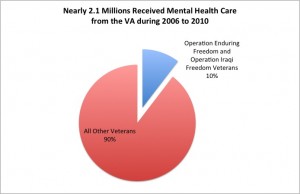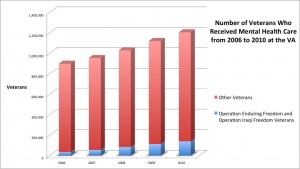WASHINGTON — More Iraq and Afghanistan veterans are receiving mental health care from the Veterans Affairs Department, but officials in a recent report still cited barriers that may be preventing some from getting the care they need.
Only a little more than 8 percent of those who served in those wars sought help from VA from 2006 to 2010, according to a recent report from the Government Accountability Office.

Graph by Laura Phelps/Medill News Service. Data from an October Government Accountability Office report.
The number of veterans from Iraq and Afghanistan getting treatment increased from about 34,500 in 2006, or 4 percent of the total, to just more than 139,000 in 2010, the GAO reported. That means 12 percent of the 1.2 million veterans who sought mental health care last year are veterans from the latest wars.
Some veterans may not seek care because they’re concerned about their privacy, they may not know the services exist, or they simply cannot get to a treatment center if they live somewhere rural, the report said. VA officials also believe younger veterans may have a perception that the system caters to older veterans, the report said. Plus, veterans just starting out in their civilian lives are often balancing priorities such as school, family and work, and seeking help doesn’t always make the list.
There are an estimated 2.6 million living veterans from Operation Iraqi Freedom and Operation Enduring Freedom, and 23 million total veterans dating back to World War II, according to the GAO.
But the two most recent conflicts are different when it comes to diagnosis and treatment for mental health issues, the report states. Since the VA has changed how it screens for mental disease, more troops may have their conditions recognized, the report said.
Now, troops are screened for PTSD, depression, substance abuse disorders and sexual trauma when they visit a primary care clinic, the report said.
Veterans were most commonly diagnosed with adjustment reaction, depressive disorder, episodic mood disorder, neurotic disorder and substance abuse disorder.
Veterans of the Iraq and Afghanistan wars were most likely to be diagnosed with adjustment reaction, which includes post-traumatic stress disorder. In those five years, 96,916 Iraq and Afghanistan veterans were diagnosed with PTSD.

Graph by Laura Phelps/Medill News Service. Data from an October Government Accountability Office report.
But VA is making changes to accommodate more patients, the report said.
From 2008 to 2011, the VA opened 60 Vet Centers to offer free counseling, bringing the total of these outlets to 292, and it plans to open eight more by the end of this year. It has also increased the number of mental health workers by nearly 7,000 to 21,000 this year, the GAO reported.
VA Press Secretary Josh Taylor acknowledged VA’s efforts to expand health services available through telecommunications as well as off-hours clinic appointments and educational promotions.
The VA also redesigned its websites for the Office of Mental Health Services and the National Center for PTSD and uses sites such as Twitter and Facebook to get the word out about mental health help.
